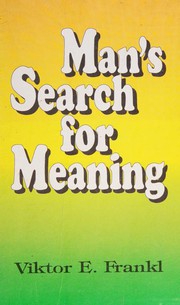Man’s Search for Meaning is an interesting blend of Frankl’s personal experiences in multiple concentration camps, alongside his personal beliefs about psychology, therapy, and the meaning of life. The most distinct and obvious conclusion I drew from this book is the pure horror of the Holocaust; truly, it is one of the greatest evils of humanity.
In his discussions of suffering and life’s meaning, Frankl quotes this line from Nietzsche, a German philosopher, many times:
He who has a why to live can bear almost any how.
Frankl was a psychologist and philosopher, and much of Man’s Search for Meaning is dedicated to his description of this philosophy. The second part of the book goes on to explain his theory, which he calls logotherapy (logos literally meaning “meaning”). Unlike Freud’s focus on pleasure, and Adler’s focus on power, Frankl’s theory focuses on “man’s search for meaning”.
The essence of Frankl’s described philosophy is this: our primary motivation in life… is to find meaning in life. Each of us must discover our meaning for ourselves, and in doing so, we will be empowered to withstand all hardship. Frankl describes quite plainly what happened to the concentration camp victims who gave up their motivation to live: they died.
In the Nazi concentration camps, one could have witnessed that those who knew that there was a task waiting for them to fulfill were most apt to survive.
He’s quite clear that he sees the struggle to determine and achieve one’s purpose as a net positive, and boredom or a “tensionless state” its negative counterpoint:
I consider it a dangerous misconception of mental hygiene to assume that what man needs in the first place is equilibrium or, as it is called in biology, “homeostasis,” i.e., a tensionless state. What man actually needs is not a tensionless state but rather the striving and struggling for a worthwhile goal, a freely chosen task… so if therapists wish to foster their patients’ mental health, they should not be afraid to create a sound amount of tension through a reorientation toward the meaning of one’s life.
Unsurprisingly, the concept of unavoidable suffering is also a key part of Frankl’s theory. Frankl has an empowering perspective of suffering: he says that, in the face of unavoidable suffering, one should find a use for their suffering; shift the suffering from pain into a motivation. Take pride and find meaning in the suffering you’ve experienced.
On the nature of humanity, Frankl expresses an interesting belief. In the course of human history, countless people groups have been labeled as “subhuman”, at which point violence and genocide are made more palatable for the perpetrators. However, Frankl believed that people were either “decent” or “indecent,” and it had nothing to do with whether someone was a victim or a perpetrator:
How is it possible that men of flesh and blood could treat others as so many prisoners say they have been treated?
…It is apparent that the mere knowledge that a man was either a camp guard or a prisoner tells us almost nothing. Human kindness can be found in all groups, even those which as a whole it would be easy to condemn. The boundaries between groups overlapped and we must not try to simplify matters by saying that these men were angels and those were devils.
…From all this we may learn that there are two races of men in this world, but only these two— the “race” of the decent man and the “race” of the indecent man. Both are found everywhere; they penetrate into all groups of society. No group consists entirely of decent or indecent people.
Finally, a notably depressing part of the book was, sadly, its description of the prisoners’ release. According to Frankl, a significant portion of prisoners did not adjust well to their newfound freedom; however, he does speak about some of the positive things he noticed.
“Freedom”— we repeated to ourselves, and yet we could not grasp it. We had said this word so often during all the years we dreamed about it, that it had lost its meaning. Its reality did not penetrate into the consciousness; we could not grasp the fact that freedom was ours.
…When we spoke about attempts to give a man in camp mental courage, we said that he had to be shown something to look forward to in the future. He had to be reminded that life still waited for him, that a human being waited for his return. But after liberation? There were some men who found that no one awaited them. Woe to him who found that the person whose memory alone had given him courage in camp did not exist any more! Woe to him who, when the day of his dreams finally came, found it so different from all he had longed for!
…The crowning experience of all, for the homecoming man, is the wonderful feeling that, after all he has suffered, there is nothing he need fear any more— except his God.
Man’s Search for Meaning is an interesting and approachable book for anyone, regardless of your experience or interest in therapy, philosophy, or WWII history. I think this book’s legacy alone makes it worth reading. Even though I don’t fully agree with Frankl’s stated philosophies (over which he has received fair criticism), this book has helped many struggling with suffering and purpose in life.
